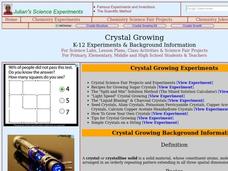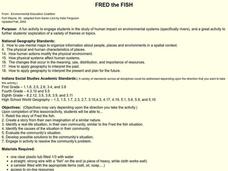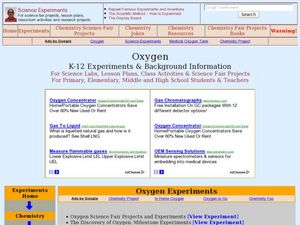Curated OER
Marshland Ecosystem
Students classify animals based on their physical characteristics and eating habits. In this animal identification lesson plan, students investigate the life forms shown on a Parisian ceramic basin, and discover ecosystem the artist was...
Curated OER
Where Are the Dinosaurs?
Young scholars explore the concept of extinction by studying dinosaurs. In this dinosaur lesson, students distinguish between extinct creatures and those that still exist.
Curated OER
Where are the Dinosaurs?
Students construct their own diorama based on the life of a dinosaur. In this dinosaur lesson, students create models of dinosaurs and dinosaurs' eggs to explore the life cycle of this extinct species.
Curated OER
Sky 3: Modeling Shadows
Students will construct models to demonstrate their understanding of shadows. Many questions and suggestions for variants on the activities are presented to allow you to tailor this lesson to your particular needs. It is best to make the...
Curated OER
Marshland Ecosystems
Students identify animals in ecosystem depicted on 16th Century ceramic basin and classify them as herbivores, carnivores, or omnivores based on physical characteristics and prior knowledge, determine which life forms in ecosystem are...
Curated OER
Crystal Growing
Students explore the different phases of a crystal. For this mineral lesson students grow their own sugar crystals using a sugar recipe.
Curated OER
Dinosaurs 1: Where Are the Dinosaurs?
Students explore dinosaurs. In this dinosaur identification lesson, students watch video clips for different dinosaurs from the Discovery Kids website. Students discuss the clips with their teacher. Students may then role play the...
Curated OER
Animals and Plants of BC's Rocky Shore
Students fill out a fact sheet and look at diagrams of BC's shore and the animals that live there. In this habitat lesson plan, students discuss the plants and animals and the different zones they live in.
Curated OER
Simple Machines
Students explore the concepts of force and effort by observing simple machines. In this physics lesson, students attempt to sharpen a pencil without any help, bite into an orange with their lips curled over their teeth, and other...
Curated OER
The Impact
Pupils see what inventors have to think about when making an invention. In this inventions instructional activity students examine Thomas Edison and the light bulb and the history of inventions.
Curated OER
Where Are The Dinosaurs?
Young scholars study what happened to the dinosaurs and possible causes of extinction. In this investigative instructional activity students create dinosaur eggs.
Curated OER
FRED the FISH
Students engage in the study of the human impact on environmental systems (specifically rivers). This lesson enhances Students' exploration of a variety of themes or topics.
Curated OER
Oxygen
Students explore oxygen and its physical and chemical propeties. In this investigative lesson plan students complete several experiments using oxygen.
Curated OER
Decomposers- Nurse Logs
Learners investigate temperate forest ecosystems. In this environmental instructional activity, students discover different forms of decomposition and its effect on the environment.
Curated OER
Water Magic
Learners conduct experiments with ice, water and steam to observe the water cycle. They discuss substances that water accumulates from the Earth as it moves through its cycle.
Curated OER
Science: Exploration Tubs
First graders develop skills of scientific inquiry. They determine which objects float and which sink.

















